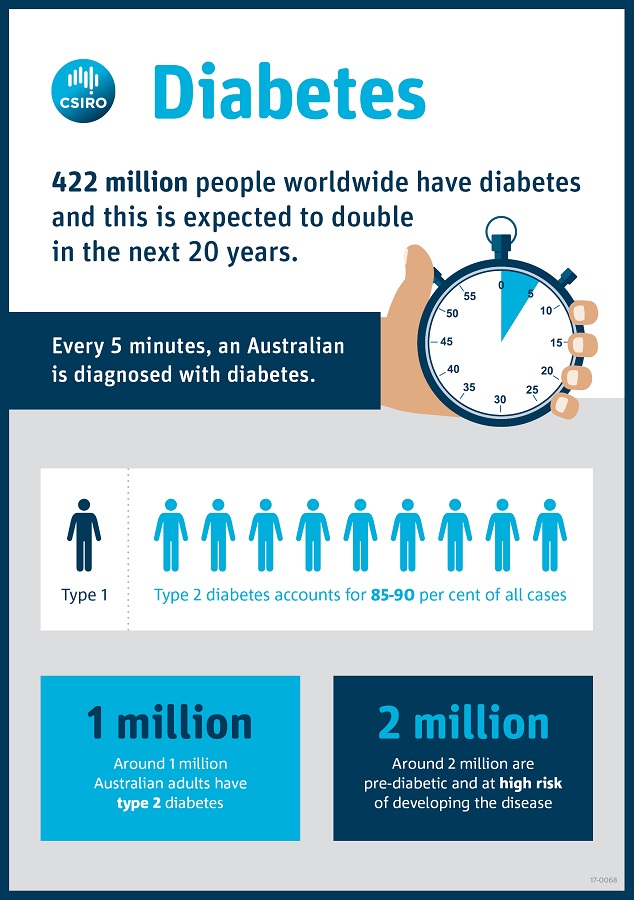
Ginger-soy beef skewers with zucchini noodle salad image
Ginger-soy beef skewers with zucchini noodle salad: one of the many tasty low-carb diet options
The obesity epidemic in Australia is resulting in an alarming increase in the prevalence of type 2 diabetes.
Approximately 1 million Australian adults have type 2 diabetes and it is estimated over 2 million people are pre-diabetic and are at high risk of developing this disease.
 That’s around 13 per cent of our entire population! It’s easy to see why our health researchers have made it a priority to discover better ways to prevent and manage this serious disease.
That’s around 13 per cent of our entire population! It’s easy to see why our health researchers have made it a priority to discover better ways to prevent and manage this serious disease.
To better understand the importance of diet when managing type 2 diabetes, we undertook one of the largest and complex diet and lifestyle intervention studies in Australia, in collaboration with the University of Adelaide, Flinders University and the University of South Australia.
The two year study compared different dietary approaches for managing type 2 diabetes: a low carbohydrate, high protein, high healthy fat diet and a traditional high-unrefined carbohydrate, low fat diet. All participants also participated in a supervised exercise program.
Significant results
One of the most significant findings for those people who followed the low carbohydrate diet was a staggering 40 per cent reduction in the amount of diabetes medication they required, twice as effective as the high carbohydrate, low fat diet. The low carbohydrate diet was also three times more effective at reducing blood glucose spikes across the day.
The results of the study is creating a paradigm shift in our thinking about how we should manage type 2 diabetes.
For the millions of Australians who are overweight and have or at risk of developing type 2 diabetes, this study could make a real difference to the diet and lifestyle decisions they make.
We are working hard to provide a clear and comprehensive overview of the science and benefits behind the low carbohydrate diet – so we’ve developed the CSIRO Low-Carb Diet book. The book provides an easy to follow, structured meal plans including recipes, clear descriptions of low-carb versus high-carb foods, shopping lists and a complete exercise plan.


7th March 2017 at 11:03 am
All in moderation but mainly plants and reduce portions ,!!!!
7th March 2017 at 4:14 pm
No.
Pollan sadly only connects about half the dots … just like CSIRO used to.
Great to see at least one accepting what the science has been showing us for decades. Now if only they could get over the sat fat phobia (again not backed by science)
10th March 2017 at 7:37 pm
Agreed absolutely .
7th March 2017 at 12:05 am
The studies referenced in the link below suggest plant based diets will have some diabetics completely off their insulin in 16 days… Why is there not more research into this? You could run the exact same study with a third group eating plant based! Any diabetics check out the video, it could be life changing.
http://nutritionfacts.org/video/diabetes-reversal-is-it-the-calories-or-the-food/
7th March 2017 at 4:36 pm
You should be aware that Greger comes from a background of militant animal rights activism and is renown (infamous?) for highly selective quote mining to ‘support’ even his own confirmation bias.
So bare that in mind! 😉
6th March 2017 at 11:59 am
I am a diabetic of 25 years standing and I found out very early on that a high protein diet would bring down my sugar levels. I was promptly told NO. NO.NO. This is a sure way to kidney problems, and diabetics are already presupposed to this problem – don’t aggravate the problem.
Has the story changed?
10th March 2017 at 12:09 pm
Why not try the 8-week Blood Sugar Diet by Dr Michael Mosley? https://thebloodsugardiet.com/ I did this for 8 weeks, lost 7 kilos, and my blood sugar is now ‘ideal’ – I just had it checked. It is a low carb diet with lots of protein, legumes, nuts, fruits and vegetables. It sounds hard core but it was surprisingly easy to do. I felt really well and alert and I was able to exercise a lot without feeling hungry. The most important thing was trimming my waist – four inches gone ! Good to get rid of that harmful visceral fat. The diet is medically sound and backed by evidence-based research. Can’t recommend it enough – it was life changing. Good to see CSIRO sending the same low carb message. Diabetes can be reversed! And better to do it by opting for a healthy lifestyle than by hoping for drugs to save you.
10th March 2017 at 7:40 pm
Low Carb High Fat diet works, just don’t get too upset if the cholesterol goes up in the short term for some people, like me! It will come down eventually. The secret is to eat good fats like avocardo, salmon , nuts and seeds. Meat is good too. And lots of salads and vegetables.
2nd March 2017 at 12:09 pm
It is encouraging that the CSIRO have woken up to benefits of a low-carb diet; however they are still perpetuating the myth that saturated fats are dangerous. Recommending skim milk destroys any credibility that CSIRO may have had.
3rd March 2017 at 7:04 pm
Perhaps they have a fat phobia!
5th March 2017 at 7:03 pm
Agreed! I was excited to see CSIRO recommending low carb, but this was quickly followed with disappointment at seeing their recommendation to eat low fat dairy. I’d like to see CSIRO doing some work on the benefits of natural saturated fats.
2nd March 2017 at 2:40 am
Became diabetic due to starting high doses of steroids and other meds. Gained almost 30kg after eating approx. >1kg of carbs per day. Changed to keto, <10% carbs per day, and in 2 days my BGLs were normal, in within 3 months I had lost 15kg. I'll never go back and no one will ever be able to convince me that people actually need carbs to live. Most doctors I spoke to about this were hesitant but supportive, yet dietitians were scolding me. If it works, it works. Now that I've lost so much weight I have increased my carb intake but not anywhere near the same levels as before.
10th March 2017 at 7:44 pm
Agreed, I am in the same boat as you. Diet controlled Diabetic, fasting blood sugar now around 4.6 to 5.3 mmol/l depending on what Carbs I eat.
Diet Doctor on You Tube and Dr. Jason Fung is a good way to start especially on his Intermittent Fasting. Do watch his video, it is full of good information.